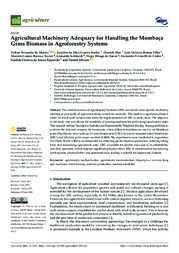Agricultural machinery adequacy for handling the mombaça grass biomass in agroforestry systems.
Agricultural machinery adequacy for handling the mombaça grass biomass in agroforestry systems.
Author(s): MORAIS, G. F. de; SANTOS, J. da S. G.; HAN, D.; RAMOS FILHO, L. O.; XAVIER, M. G. B.; SCHIMIDT, L.; SOUZA, H. T. de; CASTRO, F. T. de; SOUZA-ESQUERDO, V. F. de; ALBIERO, D.
Summary: Abstract: The current scenario of Agroforestry Systems (AFS) worldwide lacks specific machinery, resulting in practically all operations being carried out manually. This leads to a significant physical effort for small-scale farmers and limits the implementation of AFS to small areas. The objective of the study was to evaluate the suitability of existing machines for performing agroforestry tasks. This research utilizes Descriptive Statistics and Exponentially Weighted Moving Average methods to evaluate the data and compare the treatments, where different machines are used to cut Mombaça grass (Megathyrsus maximus Jacq): (i) costal brushcutter (CBC); (ii) tractor-mounted rotary brushcutter (RBC); and (iii) mini grain reaper machine (GRM). The experiments were conducted in Jaguariúna, São Paulo, Brazil. GRM is recommended for achieving greater biomass production, reducing raking time, and minimizing operational costs. CBC is suitable for smaller areas due to its affordability and slow operation, which requires significant physical effort. RBC is recommended for reducing working time, physical effort, and personnel costs, making it suitable for larger-scale contexts.
Publication year: 2023
Types of publication: Journal article
Unit: Embrapa Environment
Observation
Some of Embrapa's publications are published as ePub files. To read them, use or download one of the following free software options to your computer or mobile device. Android: Google Play Books; IOS: iBooks; Windows and Linux: Calibre.
Access other publications
Access the Agricultural Research Database (BDPA) to consult Embrapa's full library collection and records.
Visit Embrapa Bookstore to purchase books and other publications sold by Embrapa.

